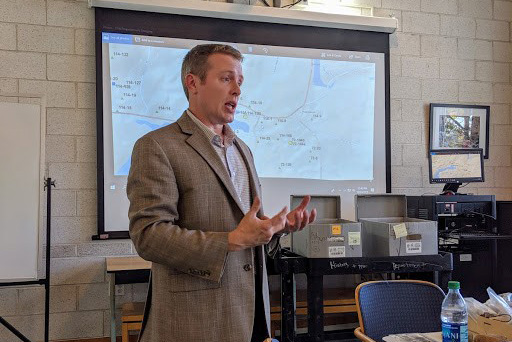- Apply
- Visit
- Request Info
- Give
3 Faculty Present at On-Campus Research Forums
Written by Dwight Bachman
Published on November 06, 2019
Faculty members Niti Pandey, David Naumec and Phyllis Lee presented respectively on the whaling industry, Native American artifacts and Children's mental health at recent on-campus research forums. Pandey and Lee presented as part of the Faculty Scholars Forum; Naumec presented as part of the Ethnicity/Migration seminars.

Professor Pandey Discusses Whaling Industry
Niti Pandey, associate professor of business administration, continued the Fall Faculty Scholars Series at Eastern Connecticut State University on Oct. 16 with the presentation “Labor Market Explanations for the Decline of American Whaling: Lessons from an Early Gig Economy.”
Pandey discussed her research into the growth, dominance and decline of the American whaling industry from the perspective of the labor market and working conditions. Whaling was a global enterprise and America dominated the industry for most of the 19th century, with a whaling fleet larger than all other countries combined. Much of the economic development in the Buzzards Bay and Nantucket region was driven by the success of early and mid-19th century whaling.
Labor market characteristics of the industry included global mobility, racial diversity and high turnover of low-skilled workers. Pandey said whaling was an unregulated industry, resulting in ship owners, agents and captains exploiting low-skilled workers, many of whom were Native Americans and African Americans. By the time the industry was in decline, working conditions on American whaleships were described as the worst in the world.
The whaling industry’s “lay” wage system — where each sailor signed on for a small percentage of the gross revenue of the voyage, determined by valuing the cargo at current market prices upon docking — meant that the risk of the voyage lay directly with the workers. Since the risk was borne largely by workers, there was little incentive for owners to improve the working conditions or the technology associated with the enterprise. Finally, because low-skilled workers had no upward mobility, the industry often attracted workers who could not obtain other employment and had no incentives for improving their skills.
Pandey drew parallels between the whaling industry and the modern gig economy, which is characterized by the use of independent contractors and freelancers who also bear the wage risk and function in an unregulated environment.
David Naumec Discusses Native America Collection

On Oct. 23, as part of the Ethnicity/Migration Seminars, David Naumec, lecturer in the History Department, presented his new research project on Native American history in Connecticut.
In 2018, a private individual donated an extensive collection of nearly 4,000 Native American artifacts to the Connecticut State Archaeologist, who gave the collection to Naumec for cataloguing and future exhibition, as requested by the donor. These important artifacts were recovered in the 1950s through 1980s from a series of plowed fields in Poquetanuck Cove in Preston, CT. The collection is the single largest grouping of Pequot artifacts identified outside of either Pequot reservation. The artifacts range in date from nearly 7,000 years ago to the first half of the 17th century.
Working with Eastern academic interns and volunteers, Naumec intends to catalogue, identify and conserve the collection, while developing several long-term exhibits on campus, at the Pequot Museum and within the town of Preston. The first of the exhibits was completed at the Center for Connecticut Studies in August 2018.
Professor Lee Discusses Children’s Mental Health Treatment in Connecticut

On Nov. 6, Phyllis Lee, assistant professor of psychology, presented “Children’s Mental Health and Treatment at Outpatient Clinics in Connecticut.” Working in collaboration with the Child Health and Development Institute and the Connecticut Department of Children and Families, Lee’s research examines children’s mental health in Connecticut.
Lee said that from 2014–17, 25 clinics across Connecticut treated approximately 47,000 children for a variety of mental health issues. Data shows an average of two-thirds of children experiencing traumatic events and 20 percent of children having difficulty with a variety of mental health issues. In a classroom, that is six of 30 children.
An even greater challenge is the fact that 50 percent of the children with mental health issues do not have access to treatment. Lee said untreated mental health leaves children with unattended distressful emotions and anxiety that creates impairment in academic and social activities, substance abuse and difficulties with many families.
The range of mental health disorders among children include ADHD, conduct problems, depressive disorder, anxiety disorder, PTSD, adjustment disorder and more, with one third of children have more than one diagnosis. But Lee said, “children are resilient and numerous community-based clinics offer a range of evidence-based treatments such as behavior therapy and CBT (cognitive-behavioral therapy) to help children struggling with mental health disorders cope.”


